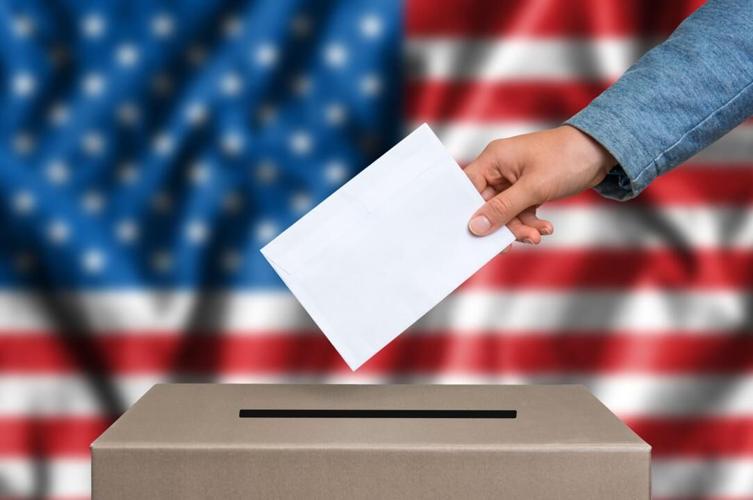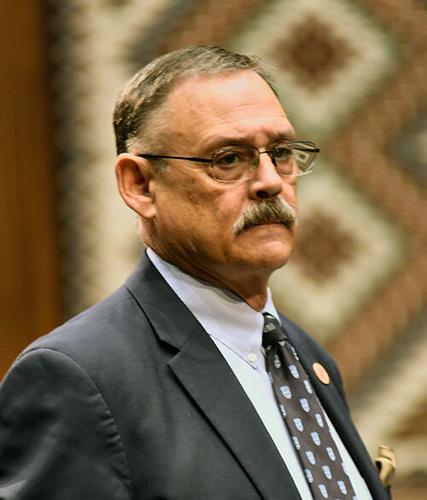PHOENIX — Mark Finchem has apparently given up on his perennial bid require that all ballots be counted by hand.
The Republican senator, in an online letter to his new constituents in Prescott, conceded a majority of his colleagues aren’t buying his arguments that having election workers at each and every voting location hand counting the ballots is the only way to ensure accurate results.
“While I prefer hand-counting paper ballots at the precinct level, not all my colleagues do,’’ he wrote.
But Finchem, a former representative from Oro Valley who moved to Prescott after losing his 2022 bid to become Secretary of State, has a fallback position. He wants a law that says if Arizona sticks with machine counting — currently the only method allowed by statute — the tabulators must “meet Department of Defense-level cybersecurity standards.’’
It’s just one of a series of ideas to revamp the state’s election system being introduced by Finchem that he wants adopted when lawmakers return to the Capitol on Jan. 13. And the package even includes a fairly radical proposal to change the date of some elections.
The fight over machine tabulation is not new. There have been proposals for years from some Republicans who insist that the machines can be hacked and reprogrammed to give incorrect results. Those claims have been rebuffed by counties who say the machines are not connected to the internet.
And then there’s the fact that state law requires a random hand count of selected races from selected precincts. That would reveal any discrepancies between the votes cast and what the tabulators report.

Finchem
Finchem and Kari Lake, both candidates for statewide office in the 2022 election, even tried to get a federal court to declare that voting machines are unreliable and should be banned. That was a direct outgrowth of claims by both that the 2020 election was stolen from President Trump, a position that, to this day, neither have disavowed.
U.S. District Court Judge John Tuchi tossed the lawsuit, saying that their claims were based on a lot of “what if’’ speculations. And even the U.S. Supreme Court refused to hear their case.
That leaves the tabulation machines in place — and Finchem’s new proposal to require they meet certain cybersecurity standards.
“If the machines cannot guarantee stand-alone security, they will be prohibited from use in Arizona if the bill passes,’’ Finchem said in his letter to constituents.
Finchem, who declined to comment, also is pushing another measure that also could provoke opposition: Moving some elections to odd-numbered years.
The problem, he wrote, is the sheer length of ballots: In some counties in the just-completed election, the races for federal, state and local offices, coupled with special district elections, bond questions, judicial retention and 13 ballot measures meant voters were faced with two double-sided pages to fill out.
That may be less of an issue for those who vote at home. But it presents potential problems for those who choose to fill out their ballots at local vote centers.
Finchem’s proposal would move all ballot measures to odd-numbered years. Also moved to that cycle would be the votes for judges.
“This will streamline the system and help to reduce the size of the even-year ballots,’’ he wrote.
But what Finchem is trying to do actually works against what Republican lawmakers have been adopting for nearly three decades.
More recently, lawmakers in 2012 declared that all elections must be conducted in even-numbered years — and only on dates spelled out by the Legislature.
That was primarily aimed to force certain cities, including Tucson, to give up having elections in odd-numbered years.
City officials argued that separate date ensures that local races — and local ballot measures — are not swept up and buried under debates about who should be president or governor, or about statewide ballot issues.
But Sen. J.D. Mesnard, who has been the prime proponent of consolidated elections, said the flip side of that historically has been lower turnout.
Tucson has so far managed to maintain its off-year elections, with the courts ruling charter cities are entitled to make those decisions for themselves. The Chandler Republican, however, said the principle of promoting maximum voter turnout remains — and lawmakers should not tinker with election dates as Finchem is proposing.
“I think there’s an expectation by voters that elections happen every two to four years, in November,’’ he told Capitol Media Services. “I still believe that.’’
Mesnard said he recognizes what happened this past November with the longer ballot.
“That’s unusual to have a second page,’’ he said. “I don’t know that we should revamp the system because of a relatively infrequent circumstance.’’
Still, Mesnard said if this becomes “the new norm,’’ with repeat elections with multi-page ballots, he’s willing to discuss the issue.
Finchem has other ideas he wants lawmakers to consider this session.
One would require that ballots have “currency-grade watermarks,’’ with an “auditable supply chain’’ to ensure that only official ballots are being given to voters and counted.
Much of this concern traces its roots back to the 2000 presidential election where supporters of Donald Trump claimed that 40,000 fake ballots had been inserted into the system here in Arizona to secure a victory for Joe Biden.
That resulted in a post-election “audit’’ of the presidential race ordered by then-Senate President Karen Fann who contracted with Cyber Ninjas. They brought in an army of volunteers examining each ballot, looking for bamboo fibers based on arguments that the ballots had been flown in from Asia where bamboo is used in making paper.
None was ever found.
The idea of watermarks is not new, at least on a national level. California has regulations that require ballot paper have a watermark. So do Tennessee and Georgia.
Other Finchem proposals include:
- Making voter registration rolls a public record, allowing anyone to check out who is signed up to vote and, presumably, file reports with county officials of those who are not living there or otherwise not eligible to cast a ballot;
- Prohibiting the use of gift card to fund political campaigns as they cannot be linked to a contributor, allowing violations of campaign finance laws;
- Eliminating what Finchem said is a gap in campaign finance laws that bar donations by foreigners to candidates in Arizona elections but do not preclude them spending money for or against ballot measures.






